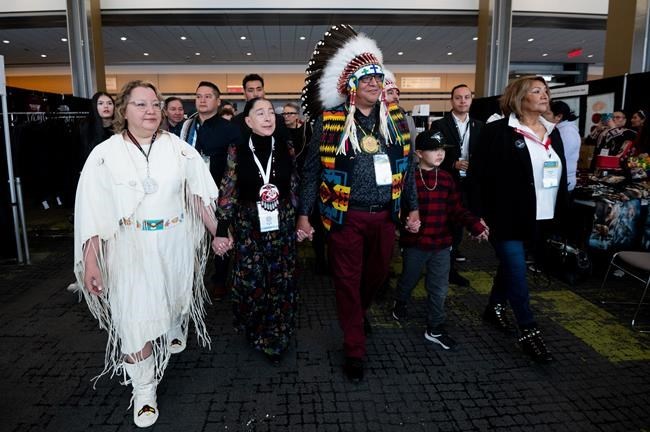OTTAWA — After a late night and long morning of voting, deal-making, concession speeches and tense last-minute pleading, Cindy Woodhouse was elected Thursday as the new national chief of the Assembly of First Nations.
In her new post, Woodhouse, 40, faces the daunting task of uniting more than 600 chiefs after years of bitter internal strife, punctuated with complaints from chiefs that the assembly often neglects their best interests.
That's why Woodhouse and David Pratt, the challenger whose strong showing throughout 15 hours of voting Wednesday kept him in the race, took to the Ottawa convention centre floor in a hand-in-hand show of unity.
"I knew it wasn't doing our convention any good to prolong it when we're facing a housing crisis, when we're facing a suicide, opioid, crystal meth epidemic in this country," Pratt said as he conceded victory.
"You leave here with one word from me: We leave here united, we leave here behind our national chief. We're back, and the future belongs to First Nations."
Pratt, who serves as first vice-chief for the Federation of Sovereign Indigenous Nations in Saskatchewan, trailed by about 10 per cent throughout the six rounds of votes that began Wednesday morning and ended shortly before midnight.
That's when organizers, facing the Shaw Centre's imminent closure for the night, called a halt to the stalemate — Woodhouse had not cleared the necessary 60 per cent vote threshold — and scheduled a seventh ballot for Thursday morning.
It never happened.
"You have to work with First Nations people in a good way," warned Woodhouse, formerly the assembly's regional chief in Manitoba, after taking part in an elaborate oath of office ceremony.
"If you don't listen to our people, you don't listen to our chiefs, you don't answer them, then there's problems. And so, to Canada: we're coming for you."
Murmurings from both camps Thursday suggested Woodhouse and Pratt had reached a deal to make her the winner after late-night and early-morning discussions alongside interim national chief Joanna Bernard.
Part of that deal included collaboration between Woodhouse and Pratt on issues surrounding child welfare, Woodhouse confirmed later in the day.
Woodhouse thanked former national chief RoseAnne Archibald during her acceptance speech, saying she "smashed glass ceilings for all of us."
Arhibald was the first woman to be elected to the position in 50 years, but was ousted earlier this year over the findings of an investigation into complaints from five staff members about her conduct. Woodhouse was an executive at that time.
A third-party independent review of Archibald found some of her behaviour amounted to harassment, and that she had breached confidentiality rules and violated internal policies by retaliating against complainants.
Archibald denied the allegations. Her supporters maintain she was removed from the post for trying to change the organization's status quo.
Of the 231 chiefs who took part in the special assembly earlier this year, 71 per cent voted to remove her.
Her ouster triggered a legitimacy crisis and divided chiefs, but Woodhouse vowed that she would work hard to bring them together and restore the assembly's lustre.
"I don't want a big band office," she said. "I want a strong advocacy office."
It turns out her advocacy work was already underway: Woodhouse said she had already spoken with a number of political leaders, including Prime Minister Justin Trudeau.
She urged him to invest in infrastructure and "all those things that, maybe, Canadians take for granted," she said.
Some chiefs want the assembly to take a more adversarial approach to their relationship with the government — something Woodhouse acknowledged is sometimes necessary.
"But at the same time, there's also a time to try and work through these things … We have to sometimes kick down doors, or sometimes we have to do what we have to do to get our people recognized," she said.
"I'm coming in here as a fresh start to try and say: Let's work through some of these issues together."
The issues, say chiefs, are plentiful. Among them are First Nations policing, child welfare, a housing crisis, water quality, Métis self-government legislation and the carbon pricing system.
The Chiefs of Ontario, an advocacy group representing 133 First Nations, has asked the Federal Court to undertake a judicial review of the system the federal government has put in place to extract a price for pollution.
The chiefs say the regime is discriminatory, in part because its rebate mechanism is tied to the federal income tax system, which many who live and work on reserves do not use.
Woodhouse said she's "absolutely" willing to support the application, and wants the AFN to take a closer look of its own at the carbon regime.
"From what I'm hearing, it's going to hurt our people," she said. "We should have a proper legal strategy on that, as well as a political lens on it."
Woodhouse promised that she would prioritize issues brought forward by the assembly's chiefs, no matter their scale.
"First Nations from coast to coast to coast have to be unified … We have a lot of work to do," she said. "We need to make sure we're working together for progress."
This report by The Canadian Press was first published Dec. 7, 2023.
— With files from Stephanie Taylor in Ottawa
Alessia Passafiume, The Canadian Press



